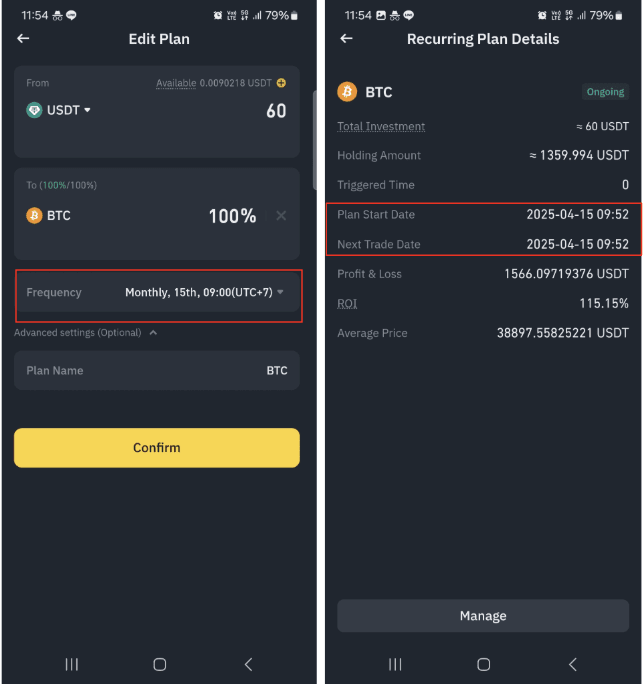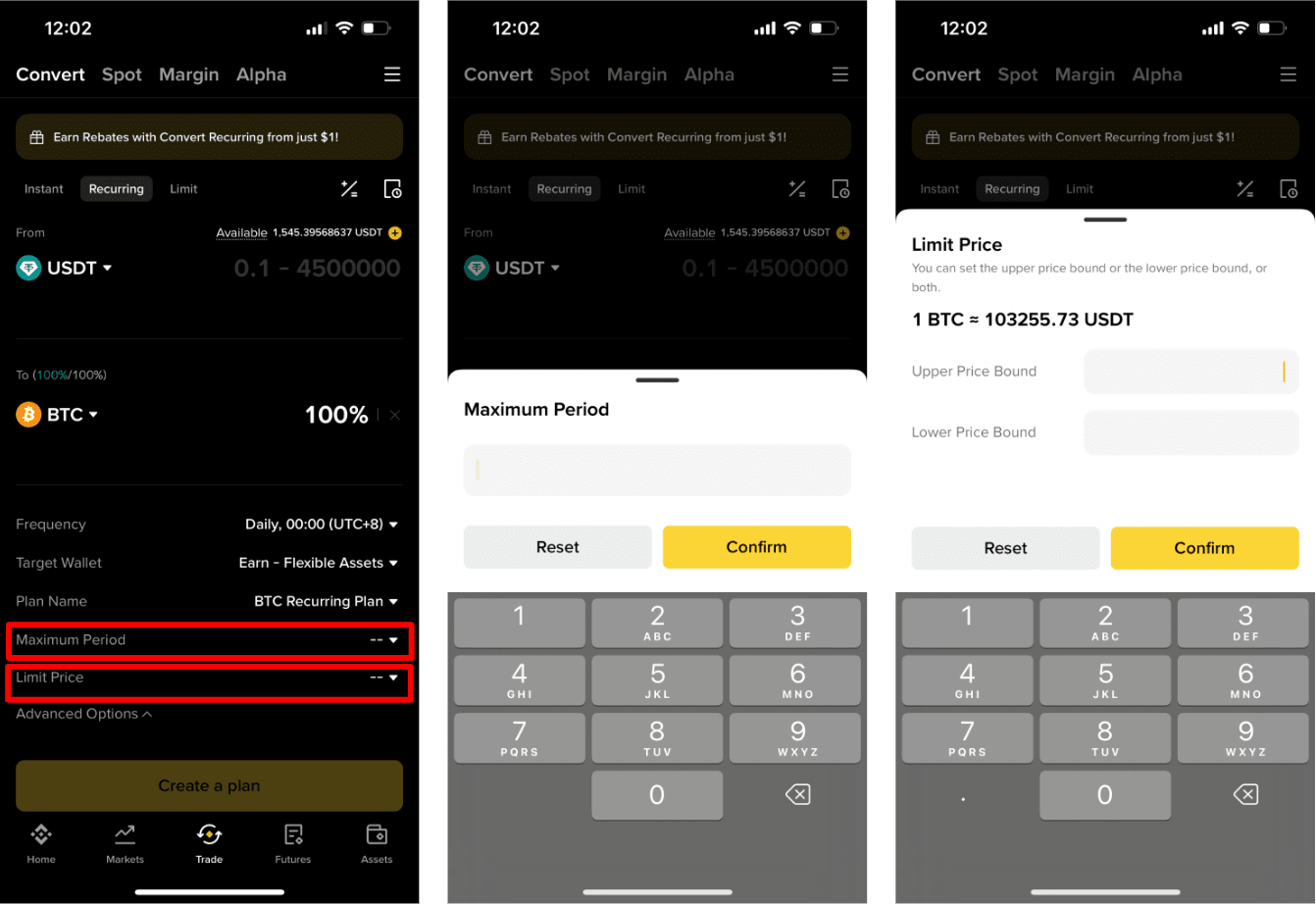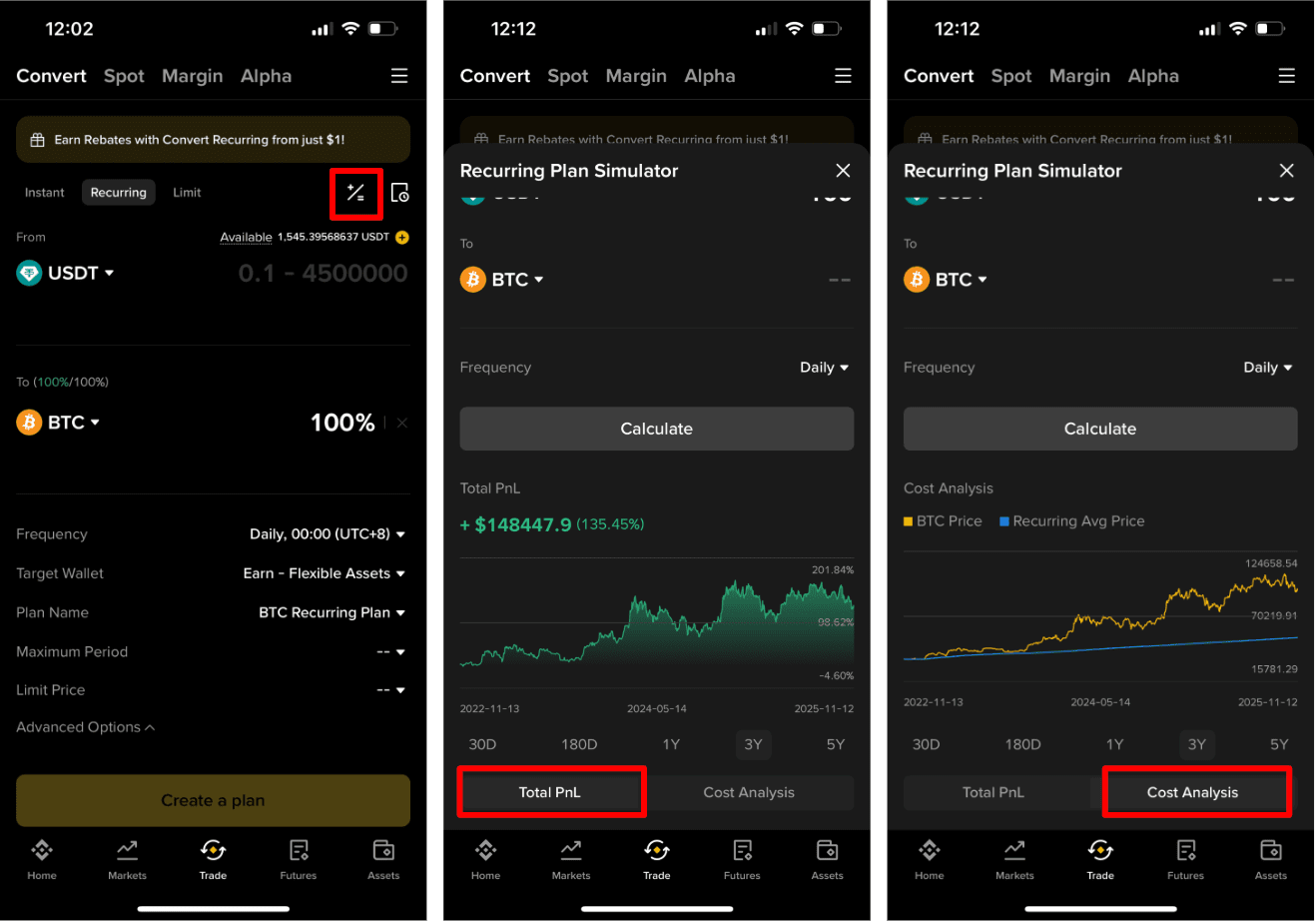Disclaimer: In compliance with MiCA requirements, unauthorized stablecoins are subject to certain restrictions for EEA users. For more information, please click here.
When trading on Binance Convert, you are subject to the Binance Terms of Use and the Convert Terms of Use. You may also be subject to the localized versions of these terms if you are onboarded to local Binance entities. Should you have any questions, please contact Customer Service.
Binance Convert “Recurring” allows you to automate crypto investments and grow your crypto holdings with Zero Fees.
It is a dollar-cost averaging (DCA) investment strategy, which involves investing a fixed amount of assets at regular intervals. You can choose the cryptocurrencies you want to purchase on an hourly, daily, weekly, bi-weekly, or monthly basis.
Recurring prices are different from market prices on Binance Spot. All recurring transactions are conducted in accordance with the Convert Terms of Use.
The price of the cryptos purchased will be recorded under [Orders] - [Convert History] - [Recurring History].
You can view your ongoing Recurring plan(s) from the Recurring homepage.

You can view your transaction history under [Orders] - [Convert History] - [Recurring History].

You can pause, cancel or edit the recurring plan on the homepage. Please take note that the Recurring plan will be ongoing until the plan has been cancelled by you, or when there is insufficient “From” token assets in your wallet.

If your selected Wallet balance is insufficient to cover the Recurring plan purchase, the purchase will fail. The system will continue to try to make another purchase on the next Recurring cycle, if the execution fails continuously for a 6-month tenure, the recurring plan will be cancelled.
You can only subscribe to a maximum of 20 Recurring plans. This limit includes all ongoing and paused plans under [Recurring Plan].
The initial trade of your plan execution depends on the scheduled time of the plan. For 1/4/8/12 hourly plans, the initial trade occurs 1 hour after the plan creation time. For daily, weekly, bi-weekly and monthly plans, the initial execution time depends on the scheduled date and time.
The exact execution minute of the plan will be the same as the plan creation time’s minute. Please refer to the examples below.
Example 1:
Action/Plan | Time | Date |
Subscribe to Hourly plan at 14:13 (UTC+8), 14 March 2025 | 14:13 | 14 March 2025 |
| First recurring execution | 15:13 | 14 March 2025 |
| Second recurring execution | 16:13 | 14 March 2025 |
Example 2:
Action/Plan | Time | Date |
Subscribe to Daily plan (every day at 8:00) at 14:17 (UTC+8), 14 March 2025 | 14:17 | 14 March 2025 |
| First recurring execution | 8:17 | 15 March 2025 |
| Second recurring execution | 8:17 | 16 March 2025 |
Example 3:
Action/Plan | Time | Date |
Subscribe to Daily plan (every day at 19:00) at 14:25 (UTC+8), 14 March 2025 | 14:25 | 14 March 2025 |
| First recurring execution | 19:25 | 14 March 2025 |
| Second recurring execution | 19:25 | 15 March 2025 |
Example 4:
Action/Plan | Time | Date |
| Subscribe to Monthly plan (at 17:00) of 31 Jan 2025 at 14:35 (UTC+8), 31 January 2025 | 14:35 | 31 Jan 2025 |
| First recurring execution | 17:35 | 31 Jan 2025 |
| Second recurring execution | 17:35 | 28 Feb 2025 |
| Third recurring execution | 17:35 | 31 Mar 2025 |
Note: A ‘full month’ refers to the execution that will happen on the last day of the month, regardless if the month falls on the 29th, 30th or 31st.

The minutes displayed under 'Plan Start Date' and 'Next Trade Date' indicate the approximate time at which the trade is executed and it follows the timing when users created the plan. For detailed examples on transaction execution, please refer to Question 6.
The advanced features in Convert Recurring give users more control over their investments. Users can set limits on how many times and how much they invest, and choose price ranges for when their orders can be executed. This helps users invest smarter and avoid missing good buying opportunities.
a. Maximum Period - Users can set a limit on the number of purchases in their recurring plans.
b. Limit Price - Users can specify price ranges for order execution in their recurring plans.

c. Recurring Plan Simulator - Users can now compare strategies and optimize their recurring investments with Recurring Plan Simulator which provide insights into the projected PnL and cost analysis.
